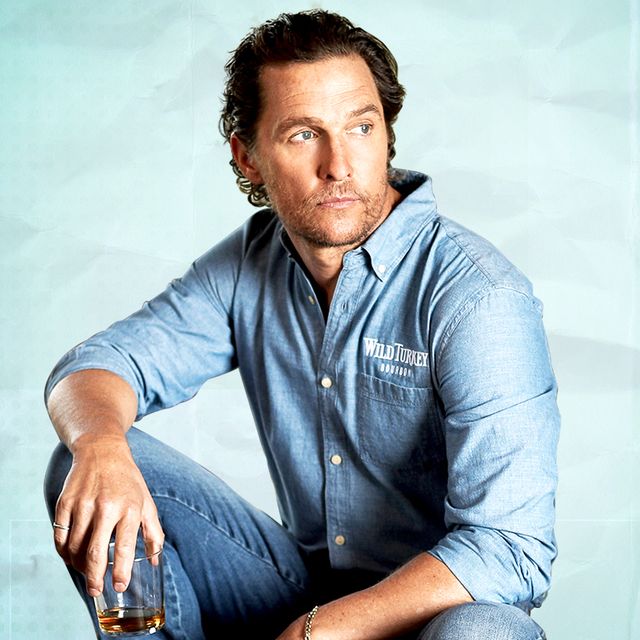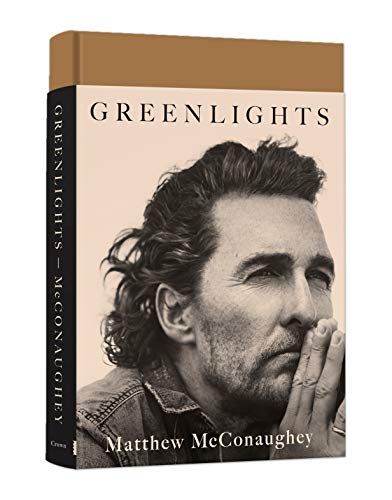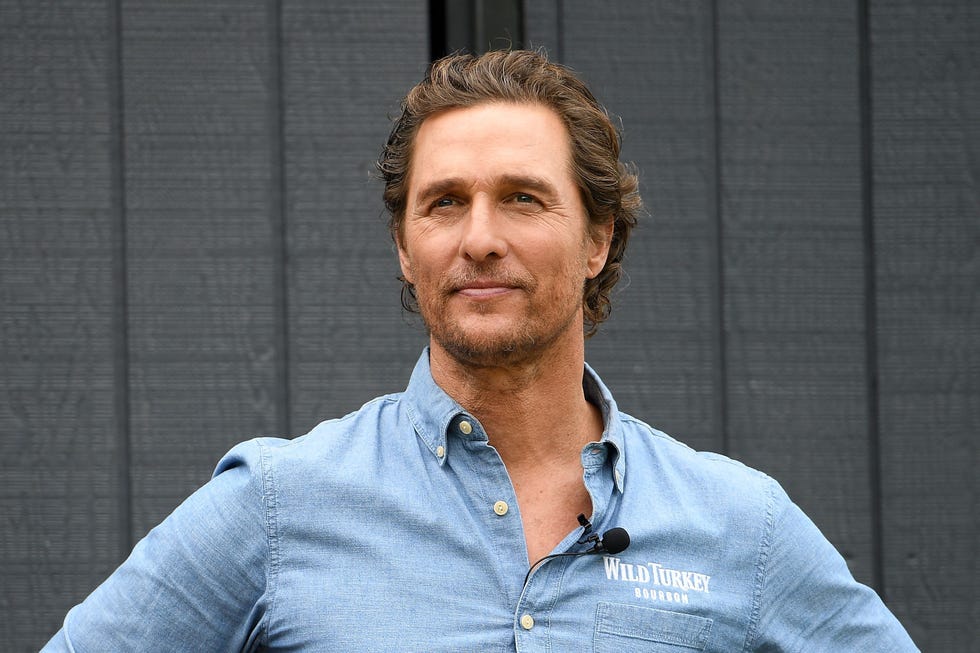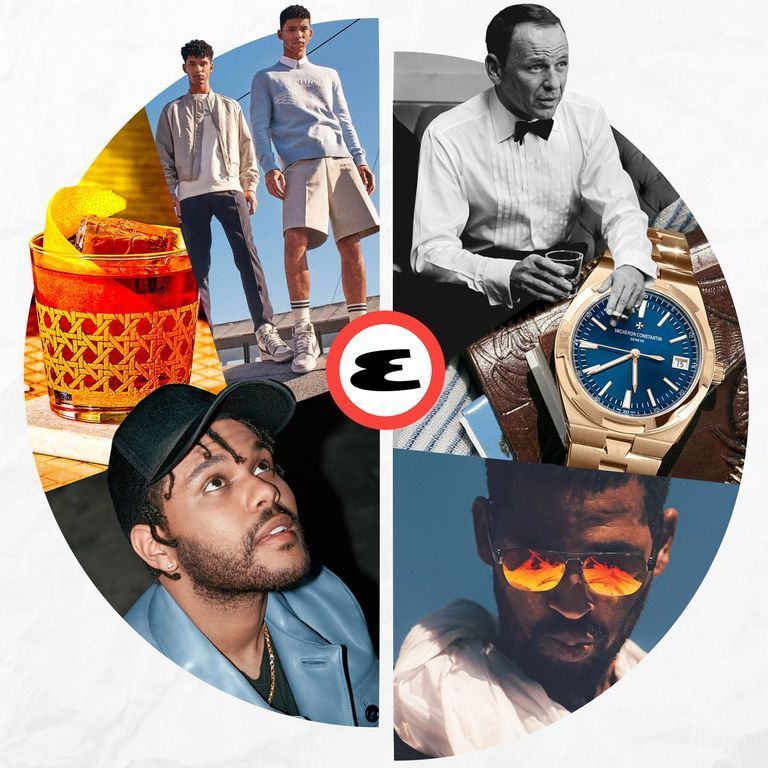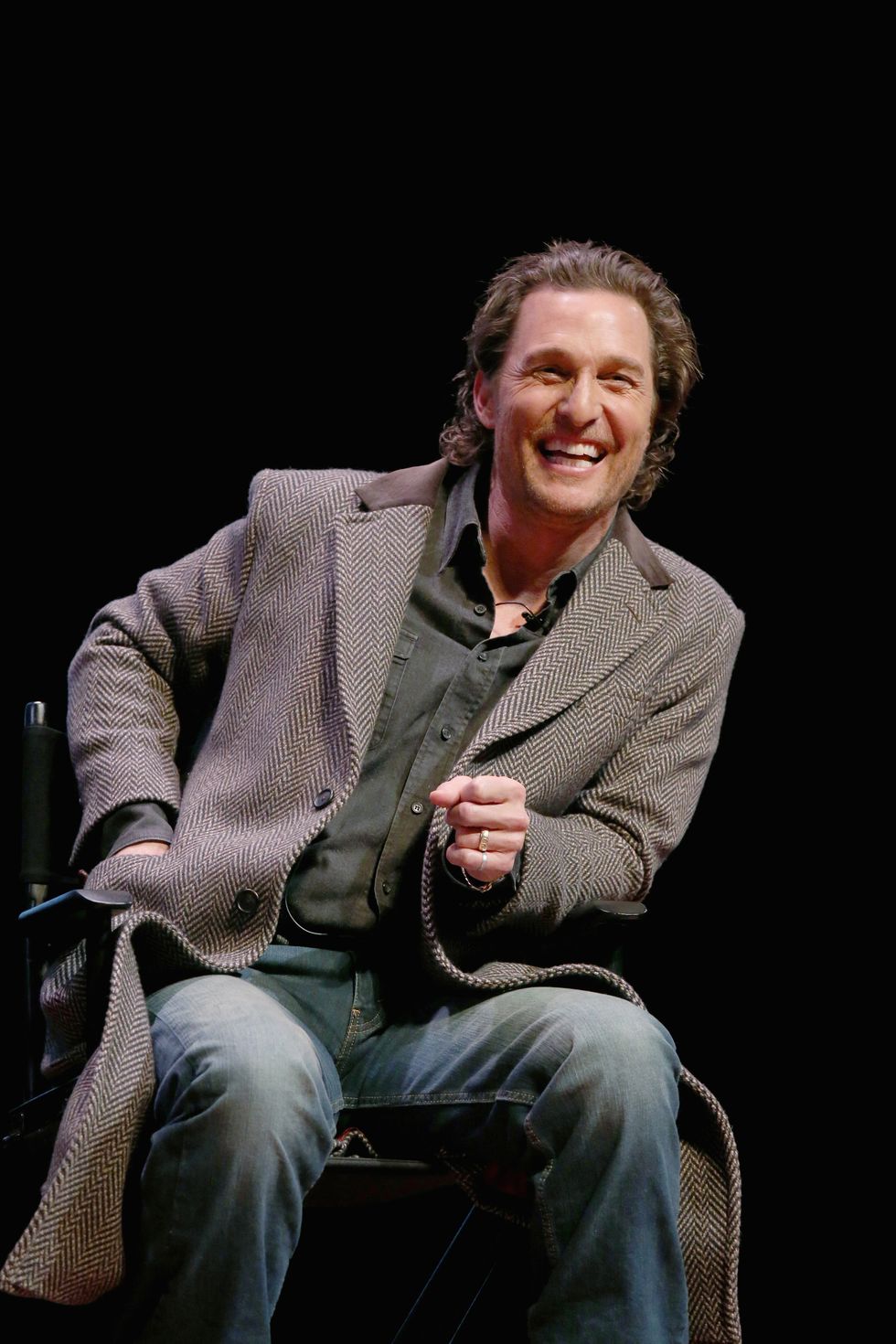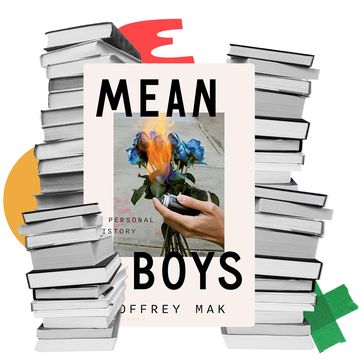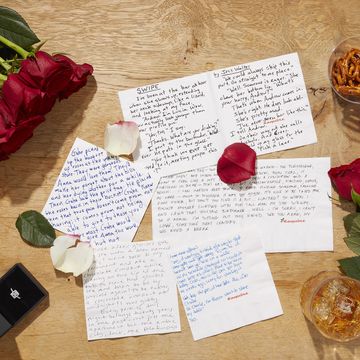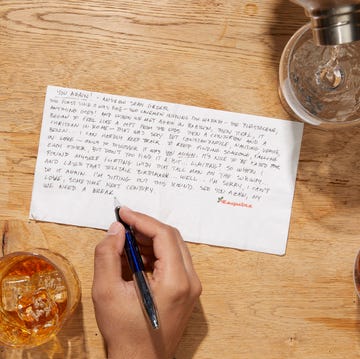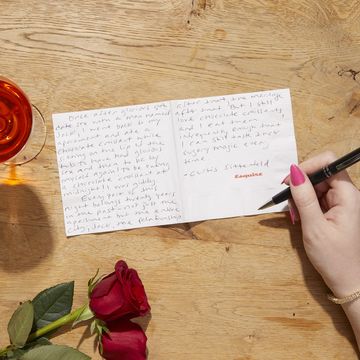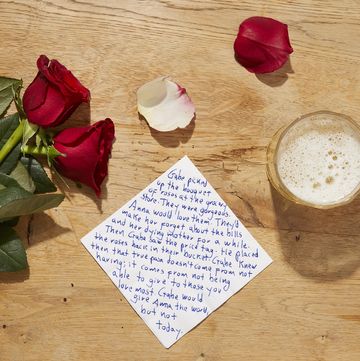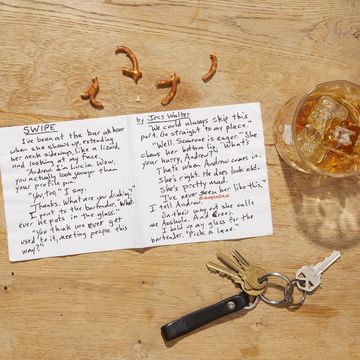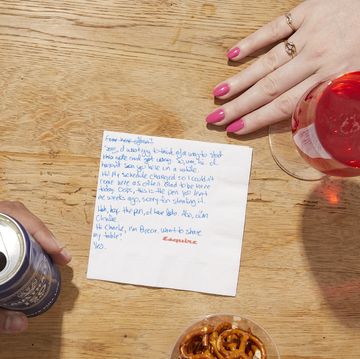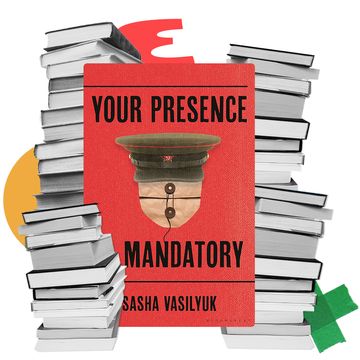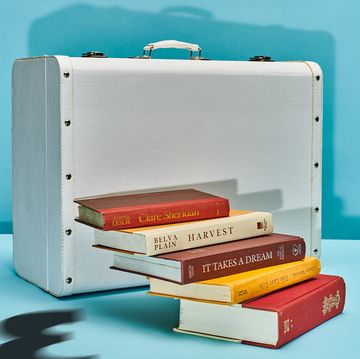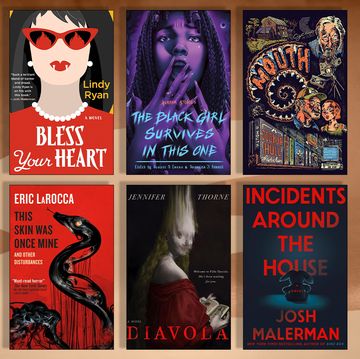Matthew McConaughey isn't quite sure when to clock it. At three months? Four months? Five? Five and a half? The rub: When can we switch over from waxing on and on and on (and on!) about how the pandemic might change us, to looking down at our watches of existential terror and being able to finally say: Okay! Nowww it's been long enough to measure the circumference of the welt this thing has left. We're talking months and weeks and days here.
When I suggest to McConaughey that, hey, maybe eight months of hellworld has been long enough to justify the inspection of damages, he cracks up a little.
"I love what you just said!" McConaughey says. He repeats my words back: “Now it's been eight months, I think that's enough time to see whether we've changed.”
Well, yeah man. For me, at least.
"Is it?"
McConaughey is still figuring it out himself. He takes the Will the pandemic change us? trip in the final few pages of his memoir/poetry collection/album, Greenlights, which has been out for nearly a month now. It's the summation of over 30 years of McConaughey's journals and a 52-day-long solitary confinement—where he'd write up to 21 hours a day—putting it all together. Greenlights is a riot with and without context. Wet dreams. Three of them! Literal pissing contests. Wrestling the behemoth champion wrestler of Begnemato, the remote village you’ve never heard of. There’s heart, lots of it, which we’ll get to once you read about what happened when McConaughey tried to Ray Lewis a cow. Less dating escapades, more trying to not deck the living shit out of a small Australian man. And some of the lines, my God: There is nothing wrong with smokin a little fun stuff and playing your drums naked at night in your own home; who do they think they are comin in your house like that?!
McConaughey is wrapping up the Greenlights tour and starting a new one—spreading the good word about Wild Turkey’s “With Thanks” campaign, where he’s been surprising pandemic-times heroes: Paying hospital bills, fronting vacations for whenever we can vacation again. Since Greenlights, if anything, revealed McConaughey as a man who's always, well, thinking, we wanted to get him on the phone to ask for some clarity in our post-election (kind of), mid-pandemic, world of rampant bullshit. If you can get over poking fun at the guy with the shitty alright alright alright joke you’ve been making since the ’90s, then you might learn a thing from Greenlights—and what Matthew McConaughey has to say about Greenlights—too.
Matthew McConaughey: McConaughey.
ESQ: Matthew, how are you?
MM: Good, man! Doin' the deal. Hangin' around.
ESQ: In Greenlights, I'd often stop and think, holy shit, with some of the turns of phrase you have in here. “I'd been going to bed with an itchy butt waking up with a stinky finger for long enough.” Where does this stuff come from?
MM: [Laughs.] A lot of those are things I've heard along the way. That's a funny line. It's a line that came from somebody I heard in a trailer park. It was the same kind of line that a person said to me, another person, eight years earlier. It's the same voice. It's the same kind of person. I’m always askin’ people: Hey, what’s the best advice you’ve got? Well, eight years earlier, a lady goes, “Best advice? Don't eat the coleslaw at 4 p.m. at the 4th of July picnic. The mayonnaise is under the sun. It's gonna make your stomach upset.” And I was like, “That's great advice! That's hilarious.” You hear a lot like that. Or you hear the stinky finger line. It puts you in a certain place. Part of the goal of the writing was to keep that balance and try to keep those multiple different voices of people, ages, races, sexes, socioeconomic levels and places I've been on my travels.
ESQUIRE: You’ve talked about your seclusion for writing the book, but not about what your day-to-day routine was like. What would one of those 21-hour-long writing days look like for you?
MM: I learned early on that I wasn't a good writer when I was drinking [laughs]. That good ideas can come after I've had a drink. But not to write. So my process would be this. I would get three or four hours of sleep—and I had already made my tea and it's steeping in a Yeti thermos before I've gone to bed. I've got my laptop plugged into the wall right next to my bed. So I would usually get up and start writing at night. Not even move, just lean over there—and, literally did this last night—read the last five pages of wherever we were, get me up to speed. And then sit there, find a rhythm in the previous five pages and try to continue that rhythm.
If I'm starting a new story, I would finish a section and start something new first thing the next morning. It would matter what the story was. Meaning the middle section, the days in Hollywood and Chateau [Marmont], I'm flingin’ that at you rock and roll time. And I wrote that way at first—it feels like a Doors album. So it feels like Bob Dylan just flinging stuff, bop, bop, bop, bop, bop. Other things like that are more academic, that was another headspace that maybe after I’d go for a run in the afternoon. Or after I've had three cups of matcha tea and my brain's really firing, right? That early morning when I feel tired? Some of the best songs would come then because the frame is a little bit fuzzy. Because you only listen to a bassline. In my mind. And if I can get the right sentence. I remember sitting there for three, four hours, just trying to get the right sentence to start the story. If it feels right, if it's got the right jazz to it, then the rest of the story just comes. Just fly through the rest of it. You have to find the meter, usually in the very first sentence of a story.
ESQ: The idea you write about that resonated with me was the concept of frequency, right? Being on and off, being more or less of yourself. What can we do to snap ourselves back on when we're feeling off? How can we be ourselves when we aren't feeling like ourselves?
MM: I hear you. Sometimes we're not ourselves because we just need to get some sleep, forget all responsibility, get a good night's rest. Have a drink. Or drink as much as you want. Just forget it for a while. When you wake up going Oh, god, wait I changed my whole frequency here. I didn't find mine but I got off of that one! Other times, you can go the opposite way, which is to go the harsh way. Don't ease out of it. Take the coldest ice bucket bath and make it shock your system. You can wake up and you're like Oh, fuck! Other times, it's like, I’m sick and tired of it! I'll endure that feeling. Don't give yourself to either one of those extremes I just listed. Get through the discomfort. Don't pull a parachute. Don’t go online to entertain yourself. Don't pick up the phone. Turn your phone off. Cut yourself off to where you're absolutely paranoid and stuck with yourself. But just sit there and go through it and you will go through the cleansing process to where you will recalibrate.
ESQ: To go off of the idea of sitting with yourself—you wrote about the loneliness and suffering you faced in Australia, and how it was one of the greatest sacrifices you've made in your life. Do you think we need a period of suffering in our lives to be truly happy later on?
MM: I think most people, we need to create resistances for ourselves. We need to go through sacrifice, to go without, to recalibrate, to appreciate what we do have. Or you know, to dry out. And I don't mean literally dry out from external drugs. I just mean sober up in life. To how we feel about others, what we expect from others, what we expect from ourselves, what we have in our house, the things we have, the things we haven't said thank you for years, that not everyone has, but should be thankful for. We need to find our baseline again. I think there's great value in that. My hope is that COVID has been a force to weather—a sacrifice that will make clear the value in the future. We'll see. I think it's part of evolution because you get more meaning, and things you do have more value when you have to go without them. You come back and they mean what they used to mean, but they now mean more. And so, we're becoming richer humans through what, because we went without, because we followed a penance or sacrifice or a fast or what have you. There's great value in that.
ESQ: You write about the pandemic in the last pages of the book—and the possibility of us changing for the better from it. Now that we're eight months into it, I feel like maybe that's enough time to reflect. Do you think we’ve changed?
MM: I love what you just said: “Now it's been eight months, I think that's enough time to see whether we've changed.”
ESQ: It's enough for me.
MM: Is it enough? You know? Because for some of us, it won't be enough. Some of us need more if we're gonna come out changed at all. Is it enough or are we going to snap right back to our old ways? We are elastic. People are elastic, man, and intellectually, we can all agree that we've changed. Can all agree that, Yes, this is a new good idea we should go forward with. I’ve got new value systems in my life and I know what matters. And I was forced to have more empathy. Intellectually you can say that shit all the time. What happens when the corral gates open up again? Possibly everyone just snaps right back to where they were, or a lot of people. A lot of people have changed, but will the masses snap right back?
I mean, we've got this other thing going on with this political divide and COVID comin’, which has people clinging to the extremes just for some sense of purpose. We'll see how much and what the new normal will be and how much the new normal will actually be as far as how people treat themselves and others, just as it used to be. So I don't know the answer. I mean, we'll see. I do like what you said at the very beginning. ’Cause after two months, everyone goes, Phew! Got by that one, okay. But eight months may be long enough for people to go, No man, I'm never forgetting that. I’m a new person.
ESQ: You brought up politics—there's a few moments in the book that could be extrapolated to fit what we saw in the election. There was the story when you were watching those two men you thought were fighting. And when you stepped in, they scolded you and were like, “It's not about right and wrong. It’s: Do you understand?” Is there anything in that we can take with us in the new chapter in our country?
MM: I hope so. We have great distrust in the government, we don't believe them, what leaders should lead them. We're looking at politics and we're going, What's your purpose? What is politics? It sounds like a broken business. We're supposed to follow you, you’re leaders? It sounds like a pep rally. All these stations put the news out and it all sounds like soft pornography. When we don't trust ourselves, then all of a sudden we don't trust others. That can lead to anarchy. We gotta find a common denominator with which we can go, Hey, I don't care what church you go to, I don't care what side of the aisle in the White House you sit on, or the capital, and what do we agree on? What are our common denominators? I think it’s gonna certain values that we can rely on.
We're really not thinking about a long view about where we're going and how to get there, you know? The far left doesn't seem to want to ever be able to admit the evil that mankind can possess, and the far right doesn't want to think past tomorrow… I want to propose meeting in the middle as a dare. I dare you to meet in the middle, instead of like, Oh, that's a place of great compromise. I dare you to come over here and have a look, to have to meet in the middle, at least have to look at the opposition in the eye. At least shake their hand and go, Well what can we agree on?
ESQ: I mean, it probably is borderline revolutionary at this point to cross some kind of line in one direction.
MM: Phrased like that, maybe that can happen if we make that a rebellious move. You know what you just reminded me of? I have a friend of mine who said his daughters are at Beverly High and they've chosen to get rid of their iPhones and stop listening to rap music. And I said, “Oh, are they like the nerds?” And he's goes, “No, the whole school thinks they're the rebels!”
ESQ: That's pretty good. I don't want to leave without asking you about something kind of more lighthearted from the book— just because there are those Doors moments, like you said. The wrestling story is such a standout moment. What can a man learn about himself in the middle of a fight?
MM: You mean like actually for me, when I've gotten hit or pinned or slammed?
ESQ: Mhm.
MM: It didn't hurt as much as I thought it would. In the moment, it didn't. It maybe hurt more later, getting body-slammed or something like that, but it didn't hurt as much as I thought it would. Fatigue, instincts take over. Fatigue can make a coward of anybody. You know what, I want to go on attack but I'm tired. Actually my opponent's going on the attack. I'm just gonna take a few blows now because I'm betting on him tiring out, so I'm gonna let them win a couple of battles here. But I'm gonna win the war. That wrestling match, by the end of Round One I was hyperventilating. I was in great shape. Why was I hyperventilating? Because I was so damn nervous. That's why I was hyperventilating. I was exerting 60 percent of my energy cause I was on full kill. When you conserve energy in the middle of chaos, you find order in the middle of that chaos. It's beautiful. It may be a bloody dance but it'll be a beautiful dance.
ESW: With the “With Thanks” campaign, in the videos where you surprise the people, I like that you make a point of flat-out saying thank you with no bells and whistles. Why do you think it's important to stop and thank people?
MM: We want to be heard, felt, and received, and it's an easy practice. It's not hard to do. We'd all get along a whole lot better if we just thanked each other for little things that we took for granted or just expected someone to do. We all do it. I do it, too. I'll go days—I didn't thank someone in my family for doing something that they do every day, ’cause I expect it. Wife brought me tea in bed three days in a row. Yesterday I was like, “Hey, thank you!” You know? I don't want to get like, Yeah, I expect it, so then on the fourth day when you don't have tea, you're like, “Where's the tea?” No, don't get like that. If you thank them, you got a better chance to get the tea on the fourth day. [Laughs.]
ESQ: You're right—it almost becomes a mindfulness exercise at a certain point.
MM: You see in the book, I'm always for the word selfish. That word, people say, No, that's not a good thing to be. Well, why do I teach my kids to say, Yes sir, yes ma'am, please and thank you? One, because it's respect—pay your respect to the person you're talking to. But two, I tell them, “You're gonna get more of what you want in life.” So it's a selfish move as well... Those people on “With Thanks,” they're being selfless. But ask any one of them in their heart of hearts, they've all been giving to others, does it make them feel good? Oh, yeah! It makes them feel full, purposeful. And that's being selfish. So I just don't see selfless and selfish as contradictions or words of paradox. They're actually two things that should be able to stand together.
ESQ: Since you've been doing interviews for the book for a month now, is there anything you wish people would ask you about but they haven't been?
MM: You know, I'll say this: I told myself I wanted to write it. And Camila [Alves] reminded me: “Remember, what's the one rule? No rules.” I had her support. She said, “You got to do nothing. You can do anything or nothing at all.” So I gave myself that free arena. And when I told myself I could do nothing at all—well, what did I end up doing? I averaged 17-hour days. And if I'd have told myself, You have to really write a long time today. I probably wouldn't have written as long or as well. I wasn't trying to prove a point, or chase down and make something happen.
